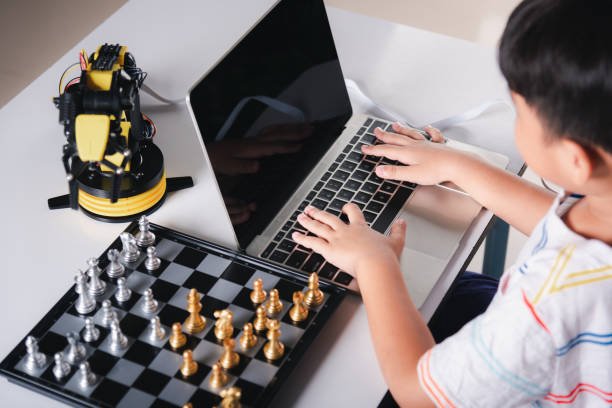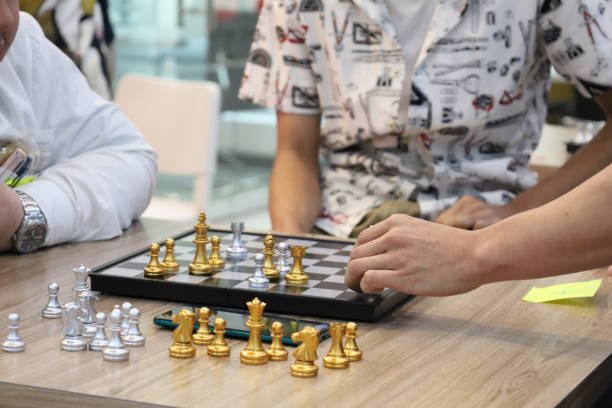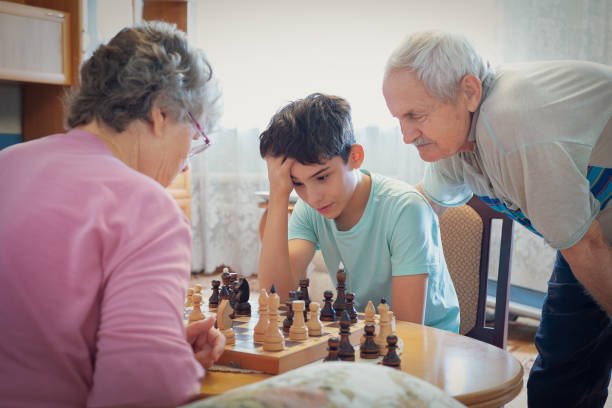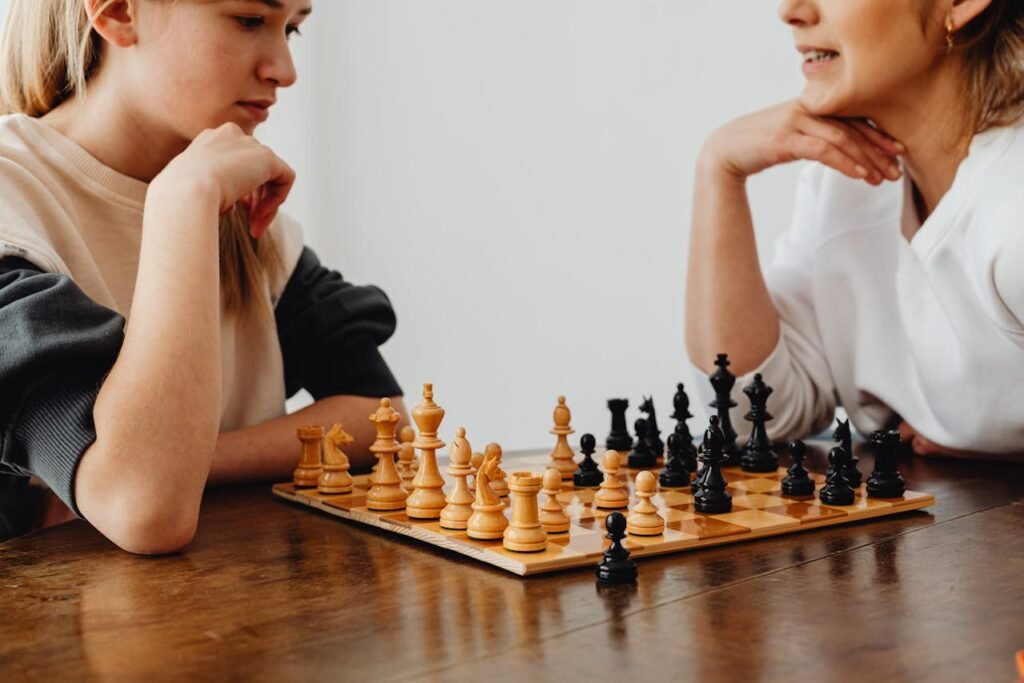Valencia loves smart games. You see chess boards in parks, schools, and sunny cafés near the Turia. Parents here want calm, focused kids. Students want clear wins and steady growth.
Coaches want fair play and brave thinking. This guide is your simple map to the best chess training in the city, with one goal: help your child improve fast, without stress.
At Debsie, we teach chess online with live, friendly coaches and a clear step-by-step plan. We keep lessons simple, warm, and focused. Your child learns how to think ahead, stay calm under time pressure, and make good choices on the board and in life.
In this article, you will see why online training fits Valencia’s busy days, why structure beats guesswork, and why Debsie stands first for families who want real results. You will also see other options in the city, so you can compare and choose with confidence.
If you want to feel our method right now, book a free trial class at https://debsie.com/take-a-free-chess-trial-class/.
Online Chess Training
Online chess training is clear, quick, and gentle on your day. Your child opens one link and enters a quiet room with a real coach and a clean board. There is no bus, no parking, no rush. The lesson starts on time, and every minute works toward one goal.
The coach speaks in simple words. The idea on the board is bright and easy to see. If a move is wrong, the coach rewinds one step and shows the better path. The child tries again while the thought is still fresh. This tight loop builds skill fast and keeps confidence high.
The digital board helps young minds focus. A bright arrow shows the plan. A circle marks the weak square. The coach flips the view so your child sees both sides. Patterns like pins, forks, and simple mates appear as shapes, not long rules.
When shapes make sense, memory feels light. The child begins to notice chances on their own, even in busy positions. This is the turning point. Games stop feeling random. Moves begin to follow a plan.
Online learning fits Valencia life. School days can run late. Traffic around the city center can slow you down. Weeknights fill with homework, music, and sport. With online classes, the schedule bends to you. Early evenings work well for many children.

Some prefer short, focused sessions after dinner. Before a local event, a quick booster session can sharpen tactics or endgames. If a school trip appears, the session moves. If exams are near, the load eases for a week and then returns. This flexibility keeps the habit alive without stress.
The human side is strong online when the room is run with care. Children greet each other by name. The coach sets a warm tone and gives each child turns to answer, to move, and to explain. Shy voices feel safe. Active minds learn to pause and plan.
Landscape of Chess Training in Valencia and Why Online Chess Training is the Right Choice
Valencia has a living chess culture. You find boards near the Turia gardens, in schools, and in community rooms across the city. Weekends host lively rounds where young players sit with focus and learn to use the clock. This is a wonderful base. It shows the city respects thinking, patience, and fair play.
Yet daily life is busy. Parents juggle work, homework, sports, and rest. Moving across town for a one-hour class can turn into three hours door to door. Energy drains before the first move. A child arrives hungry or tired. Learning slows, even in a friendly room.
Online chess training keeps the heart of coaching while removing the heavy parts. The coach is real. The board is clear. The plan is live. But the travel is gone. When a mistake happens, the fix is instant. The coach does not need to walk from board to board.
The screen shows the exact moment and the exact idea that matters. The child sees, tries, and understands. The learning loop is short and strong, which is what young minds need.
Valencia families value time outside, study time at home, and calm evenings. An online lesson protects those values. It starts when you are ready and ends on the dot. It keeps energy for the idea, not for the commute.
It fits after a swim, after music class, or between homework blocks. This fit is not a small detail. A path that fits is a path that lasts. Children improve when practice is steady and kind. Online lessons make steady and kind possible week after week.
Another reason online fits Valencia is access. You are not limited to the nearest coach. You can work with FIDE-certified teachers who match your child’s style. A gentle, patient guide for a quiet thinker.
How Debsie is The Best Choice When It Comes to Chess Training in Valencia
Debsie stands first because we blend expert coaches, a clear ladder of skills, and warm support that makes families feel safe and seen. We teach live. We teach one goal per class. We teach with simple words and bright boards.
We check understanding in your child’s own words before moving on. This keeps confusion low and pride high. Children leave each session knowing what they learned and how to use it.
Our curriculum is built like careful steps. Early lessons cover safe development, center control, and king safety. We add basic tactics such as pins, forks, skewers, and mates in one and two. Planning comes next with open files, outposts, and smart pawn moves that support a plan.
Endgames get special care because they win close games. We teach king and rook mate, king and pawn races, opposition, and simple rook endings that show how a small advantage becomes a full point.
Openings are taught by plan, not by long lists. Your child learns why a move works, so new positions feel friendly. Time use and calm habits are part of every step, not an afterthought.
Our coaches are FIDE-certified and trained to teach the Debsie way. They speak in plain language. They listen for doubt. They watch for rush. They break hard ideas into smaller parts and give just enough challenge to keep the mind awake.
They praise honest effort and correct with care. The tone is kind and firm. The pace is steady. The lesson feels like a guided walk, not a lecture.

Each session feels personal, even in a small group. Every child gets turns to answer, to move, and to explain the plan. If a mistake appears, we pause right then. We run a short, targeted drill that builds the missing pattern. When the idea clicks, we raise the level by one notch.
We run bi-weekly online tournaments that are short, fair, and fun. Players are grouped by level so games feel close. Before round one, the coach sets a tiny theme to guide choices. Between rounds, one quick tip helps right away. After the event, we send a small note with one action for the week.
Offline Chess Training
Offline chess in Valencia has charm. A wooden board on a real table. A quiet room. A coach walking between games with a kind smile. The click of a clock. A handshake. These moments feel classic and warm.
Many parents grew up this way and remember the room with care. Your child can learn manners, feel the weight of the pieces, and enjoy face-to-face play. When the setting is calm and close to home, this can be a sweet start.
In a typical class, the coach shows a position on a demo board. Children sit, watch, and copy moves into a small notebook. Then they pair up and play while the coach circles the room.
Now and then the coach leans in with a short tip and moves on. At the end, there is a quick wrap-up and a smile. The routine is steady. Some children do well with this rhythm.
Daily life in Valencia, however, is busy. School days stretch long. Traffic near the center can slow you down. The walk from the parking spot to the venue adds minutes.
By the time the lesson starts, your child may already be tired or hungry. Focus drops. The first twenty minutes become a calm-down period rather than sharp learning time. Over weeks, the small delays add up. Progress feels slow even when the room is friendly.
Feedback in a shared space can also be late. If your child makes a mistake on move ten, the coach might not see it until move thirty. The moment fades before the fix arrives. A small blind spot repeats across games because the drill did not happen right then and there.
Personalization has limits when many boards need help at once. One child needs ten quick fork drills right now. Another needs a tougher puzzle to stay engaged. The group plan decides the pace, not the child’s need.
Drawbacks of Offline Chess Training
Fixed timings create stress in a city that moves at its own pace. A late bus, a surprise school task, or a traffic jam can erase a lesson. Rhythm breaks, and in chess, rhythm is gold. Without steady practice, ideas slip and nerves rise. Children begin to think the game is “hard,” when the issue is the schedule, not the board.
Travel drains energy that should fuel thinking. A child who fights traffic arrives restless. The brain needs a reset before it can learn. No coach, no matter how gifted, can return that lost energy. Over weeks, the lost minutes and tired starts become visible as slower growth and lower joy.
Feedback in a busy room is thin. A crucial mistake screams for ten targeted drills right away. The coach wants to help, but five other boards also need eyes. The fix is delayed. The bad habit hardens. Parents ask why results do not change. The answer is simple and sad: the fix never met the mistake at the right second.
Tracking is often weak. Notes vanish. Game sheets are messy. Parents cannot see a clear line from today’s session to next week’s goal. Without data, planning turns into guessing. The group repeats openings while your child badly needs endgames. The mismatch grows, and confidence dips.

Local reach is narrow. The best coach near your home might be full. Another great coach is across town and hard to reach on weeknights. Your child’s unique style might need a specific voice. Offline, you accept what is available. Online, you match your child with the right coach from a wider pool and start right away.
Best Chess Academies in Valencia
Valencia offers many places to learn. There are cozy neighborhood clubs with wooden boards and friendly faces. There are school groups that meet once a week after the last bell. There are private studios where a coach teaches at a small table.
There are regional programs that shine on weekends. These options can be helpful, and we respect the love behind them. But most of them miss the same core needs: a tight curriculum, instant feedback, flexible times, clean tracking, and weekly tournaments designed for learning, not just for results.
1. Debsie
Debsie is number one because we turn effort into steady wins with a kind, precise system. Each class has one clear goal. We start with a tiny warm-up to wake up the eyes and the brain. We teach the idea with simple words and bright arrows on a clean board. We ask your child to explain the plan in their own words.
We run short drills that make the pattern stick. We end with a ten-minute action for home so the idea does not fade. This flow is simple and strong. It keeps focus high, cuts confusion low, and makes progress visible.
Our curriculum moves in careful steps. We begin with safe development, center control, and king safety. We add basic tactics such as pins, forks, skewers, discovered attacks, and mates in one and two.
We build planning with open files, outposts, pawn breaks, and simple attacking shapes like the classic battery on a file. We give endgames a deep seat: king and rook mate; king and pawn races with opposition; the Lucena idea for rook endings in friendly terms; how to turn an extra pawn into a win without panic.
We teach openings by plan so your child knows what to aim for, not just which move to parrot. We weave time use and calm habits through everything, from the first session onward.
Our coaches are FIDE-certified and trained to teach the Debsie way. They notice when a child guesses. They notice when a child rushes. They slow the moment, ask a short question, and guide the mind to the right path. They praise honest effort.
They correct with care. They speak in plain words. They never shame. They model steady thinking and gentle courage. Children feel safe, so they try more, learn more, and smile more.
Every class feels personal. Even in a small group, your child gets turns to answer and lead. If a mistake appears, we fix it at once with a targeted mini-drill. When the pattern clicks, we raise the level by one notch.
2. A Friendly Neighborhood Club Near the Turia
A small club by the gardens holds weekly sessions with long tables and a warm mood. Children meet friends and enjoy face-to-face play. It is a gentle option if you live close and want a local feel.
The pace is set by the room, feedback comes when the coach reaches your board, and missed sessions are hard to make up. Debsie offers the same friendly tone online with instant fixes, flexible times, and a clear plan after every class, so progress does not depend on traffic or chance.
3. A School-Based After-Class Program in the City Center
Several schools in Valencia run short chess hours right after the last bell. The mood is friendly and the walk is easy because the child stays on campus. For a first taste of chess, this can help.
The challenge is mixed levels in one room and very little time for deep review. A quick student may wait while basics repeat. A new student may feel lost when topics jump. If a child misses one week for a school trip, the group moves on and the gap widens.
4. A Private Studio Near Ruzafa With One-on-One Hours
A private coach in a small studio can be powerful when the method is strong and the schedule holds. You sit at a quiet table and get direct attention. The limits show up in travel, waitlists, and uneven structure. Many fine players teach excellent lines but do not follow a ladder of skills.
Lessons feel exciting in the moment yet leave gaps in endgames, calculation habits, or time use. When life gets busy, trips across town become harder to keep, and the habit breaks.

5. A Regional Program With Weekend Rounds and Ratings
Weekend events in Valencia are lively, with long time controls and the thrill of real clocks. Children learn to sit, think, and fight for each move. These programs are strong on competition days but light on weekday training. Parents often ask how to prepare between rounds, how to review losses, and what to study next.
Debsie plugs that exact gap. We set one theme for the week, like “count attackers before you capture,” run short drills, and test the idea in bi-weekly online tournaments that last about ninety minutes. After the event, we send one tiny takeaway and a plan for the next seven days.
Why Online Chess Training is The Future
Online training removes friction and protects focus. Your child still learns from a real coach and plays real games, but every minute is used for thinking, not traveling. The digital board lets us freeze the exact moment a mistake happens, draw a bright arrow to the best move, and let your child try again while the idea is still warm.
Modern family life in Valencia needs flexible plans. Some evenings open up; others vanish. An online class can move without breaking momentum. A short booster before a Saturday event can sharpen endings.
A lighter week during exams can keep the habit alive without adding stress. This bend keeps practice steady, and steady practice multiplies results. It is the same reason a fifteen-minute walk every day beats a long run once a month.
The internet also expands your choice of coaches beyond your street. Instead of hoping the perfect coach lives nearby and has room, you match with a FIDE-certified teacher who fits your child’s style.
A gentle explainer for a quiet thinker. A tactics-lover for a bold attacker. A structure-first guide for a student who needs clear steps. This match matters as much as any opening. The right voice builds trust. Trust unlocks effort. Effort becomes skill.
Data makes planning simple. In a strong online system, we can track which puzzles were solved, which themes still wobble, and where time was lost in games. We can spot patterns like late-game blunders or rushed openings and fix them with precise drills.
Parents see the same map in plain words, not jargon. You know exactly why the next lesson focuses on pins or on rook endings. When the path is visible, motivation lasts.
Online rooms can be kinder for many children. The space is calm. The camera shows the coach your child’s face, so we know when to slow down or add a nudge. Shy voices speak more when the noise of a big hall is gone.
How Debsie Leads the Online Chess Training Landscape
Debsie leads because we keep teaching human and precise at the same time. Every lesson has one clear goal. We show it with bright arrows and simple words. We ask your child to explain the idea back to us so we know it is truly understood.
We run short drills that lock the pattern in memory. We end with one tiny action for home, so the idea grows roots. This rhythm repeats each week until thinking cleanly becomes a habit.
Our coaches are teachers as well as players. They are FIDE-certified, trained in the Debsie method, and warm in tone. They notice when a child guesses or rushes. They slow the moment, ask a guiding question, and help the mind find the move.
They praise effort, not just outcomes. They correct with care. This is how courage grows in a young player without fear of mistakes.
Our curriculum is deep yet gentle. We start with safe development and king safety, layer in basic tactics until patterns jump out on their own, and build planning with center play, open files, and good pawn breaks.
We give endgames a strong seat because endgames win close fights: king and rook mate, king and pawn races with opposition, simple rook endings with a bridge in plain language, and the calm technique to turn small leads into full points.
Openings are taught by plan, so new positions feel friendly. Time use and a two-second blunder check are woven into everything.
Tournaments are our practice field. We run bi-weekly online events with level groups. Before round one, the coach shares a tiny theme. Between rounds, one short tip helps right away. After the last game, we send one action for the week.

Children learn to keep their head when clocks tick, to recover after a slip, and to finish games with clean technique. These are chess skills, school skills, and life skills all at once.
Conclusion
Valencia is a city of bright minds and busy days. Your child can grow fast at chess when the path is clear, calm, and easy to keep. Online training makes that possible. No travel. No rush. Just a clean board, a kind coach, and one strong idea at a time.
Debsie stands first because we mix expert teaching, a steady step-by-step plan, and warm support that fits real family life. Children learn to think ahead, stay calm under the clock, and turn small daily practice into real wins—on the board and in school.
You saw how offline lessons can feel charming yet heavy. Fixed times, long trips, and thin feedback make progress slow. Online lessons remove that weight. With Debsie, the fix meets the mistake in seconds.
The schedule bends to your week. The roadmap after each class is simple and clear. Your child feels safe to try, learns to plan, and plays with purpose.
If you want this kind of steady, happy growth, take one easy step now. Book a free Debsie trial class at https://debsie.com/take-a-free-chess-trial-class/.
Comparisons With Other Chess Schools:



